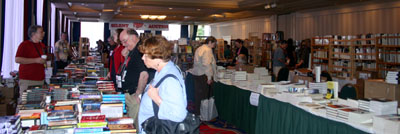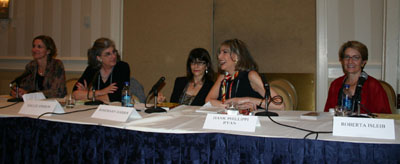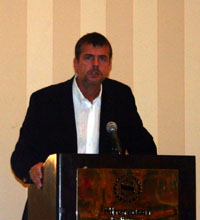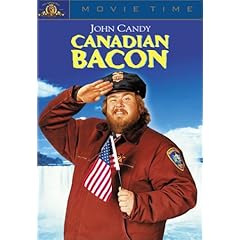Bouchercon 2008 — Friday morning…
Posted in Bouchercon 2008 on October 10th, 2008 We actually made it to the 8:30 a.m. panel this morning. The protesters were already picketing the hotel and happened to be just under our window. Evidently the Sheraton, here in Baltimore, is negotiating with their staff and things are not going well. The union had asked the convention to cancel but since that means the organizers are then responsible to pay all costs of the contract (which is a tremendous financial burden) it was impossible to cancel or to move to another venue. So, there’s is a picket line just outside the front of the hotel. I was a union steward years ago so this is a bit of a tough situation. But to eat or sightsee, I’ve got to cross that line because I’m staying here in the hotel. It’s a bit of an uncomfortable situation for all the conference attendees.
We actually made it to the 8:30 a.m. panel this morning. The protesters were already picketing the hotel and happened to be just under our window. Evidently the Sheraton, here in Baltimore, is negotiating with their staff and things are not going well. The union had asked the convention to cancel but since that means the organizers are then responsible to pay all costs of the contract (which is a tremendous financial burden) it was impossible to cancel or to move to another venue. So, there’s is a picket line just outside the front of the hotel. I was a union steward years ago so this is a bit of a tough situation. But to eat or sightsee, I’ve got to cross that line because I’m staying here in the hotel. It’s a bit of an uncomfortable situation for all the conference attendees.

I Fought the Law panel
8:30 a.m. I Fought The Law: Has CSI ruined the way we view reality? Panelists: John French (moderator), Lee Lofland, Gwen Freeman, Jonathan Hayes, Cody McFadyen.
There seemed to be no doubt that forensic science and CSI had upped the stakes in trials as people expected there to be a lot of forensic evidence and less guesswork in the prosecution of a person.
Shows and movies and authors the panel thought to have gotten it right: Bones, Medium, Dexter (except for the blood spatter thing), Jeffrey Deaver, James Lee Burke, Robert Fate, and Lee Childs.
Mentioned that criminals were also getting educated. For example, most rapists now wear condoms thinking that keeps them from leaving DNA evidence at the scene but usually they tear open the condom packaging with their teeth leaving DNA evidence. McFadyen mentioned that the profiles of rapists were changing to take into account the new mindset of those who do not wear condoms.
Evidently, bloody evidence doesn’t go into plastic bags — even though they always do that in the shows.
That Urban justice departments usually have far more people in their crime scene divisions working on the evidence than rural areas, and that it probably meant that you have a better chance of finding the criminal or getting to the truth of the evidence in an urban area.
On the subject of digital evidence, they stressed the need for a very, very, very, strict chain of evidence when using/collecting/enhancing or whatever digital evidence of any kind.

Stop I'm Already Dead Panel
10:00 a.m. Stop I’m Already Dead: Keeping a series interesting.
Panelists: Jerry Healy, Felicia Donovan, Jeff Cohen (moderator), Mark de Castrique, and Hope McIntyre.
Suggestions for keeping a series fresh and interesting to the readers included such things as:
- Tie the plot into something that is controversial or socially important and with legs enough to last until the book hits the shelves. That keeps it relevant to the reader.
- Sometimes to keep it fresh, the author needs to stop and do something else for a while so they approach the characters and series with a new outlook.
- If it’s going to be a series, make sure you like your characters because you are going to be spending a lot of time with them. If you get sick of them, it will show to the reader.
- Have enough continuing characters of depth so that you have a pool of secondary characters to draw on for plot.
- Let characters grow or let the relationships between the characters grow. They shouldn’t necessarily be stagnant but some successful series do have non-changing characters.
- Having your main character being put into the “fish out of water” plot seems to keep it fresh. In other words, take the character out of the comfort zone. If an urbanite, put the character in a rural setting — whatever make the character uncomfortable.
The panel got into a side discussion about the importance of the author’s last name for placement of books in bookstores to maximize sales. Having a name that puts you about eye level seems to be best.

Dealer's Room
We walked quickly through the dealer’s room before the next panel to get an idea of what was there. Nearly all the dealers are book sellers, which is great for me. The silent auction items are to the back of the room and there are some outstanding collections of items up for bid.
I also noticed a wheelchair bound person stumped as the panel he wanted to attend was up a set of stairs and there was no ramp or lift to get up there. Some thought if he left the hotel got into the plaza outside and went around he might be able to get on that level. Another woman I talked with, who had a walker, said that at one point to get to the lift she had to go up a flight of stairs. The hotel is not quite as accessible as some of the attendees would like.

Wolfesbane and Mistletoe (Anthology) Panel
11:30 a.m. Werewolves of London: Wolfsbane and Mistletoe, a Christmas Anthology.
Panelists: Toni L.P. Kelner (moderator), J.A. Konrath, Alan Gordon, Charlaine Harris, Donna Andrews, Dana Cameron, and Kat Richardson.
This new anthology, just out in bookstores, is of stories that are about werewolves and Christmas. The members of the panel were all contributors to the anthology and Toni and Charlaine were the editors. The panel talked about their stories and their take on werewolves. There was also mention of the duality of werewolves who are human most of the month and then turn to the “other”. They retain their humanity and yet know what they become — this is a great opportunity for writers to layer on a lot of issues.
When asked about worldbuilding and how difficult it is to do with short stories vs long. Toni had an interesting analogy. All the authors agreed that world building was easier for short stories. Toni said it’s like having company that never leaves the living room so you don’t have to clean the rest of the house. That seemed so great an idea — in a short story you’re just essentially telling one thing and you don’t need a full blown world because a lot of it is just accepted due to the story length, and you don’t need a lot of detail. In a novel you need to know how everything works because it’s a longer work and people will begin to wonder.
Now it’s our lunch break — and we’re hoping to post this before going back to the afternoon panels.




 A bit late as usual but here’s the October coffee cup. This month I chose a sunflower cup. Somehow, even though I found this cup on sale around June or July, it just seems to shout FALL to me. The leaves around here are starting to turn (well some of them are). The temps are going down into the 50s at night and not higher than 70s during the warm days. The garden is still putting out green tomatoes and some lettuce. But, I know it’s the beginning of the end of summer here.
A bit late as usual but here’s the October coffee cup. This month I chose a sunflower cup. Somehow, even though I found this cup on sale around June or July, it just seems to shout FALL to me. The leaves around here are starting to turn (well some of them are). The temps are going down into the 50s at night and not higher than 70s during the warm days. The garden is still putting out green tomatoes and some lettuce. But, I know it’s the beginning of the end of summer here.


